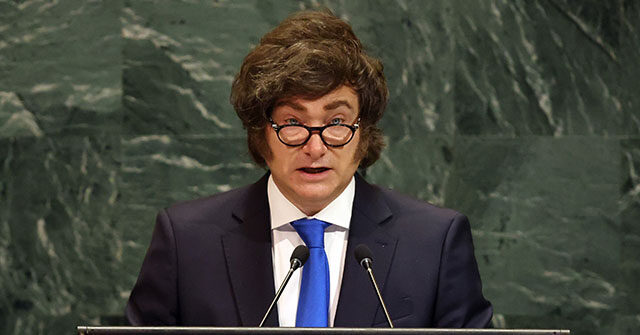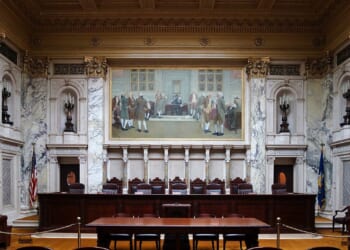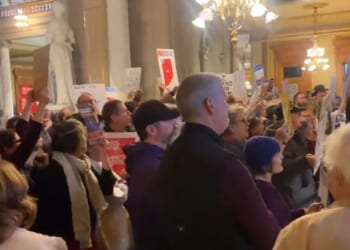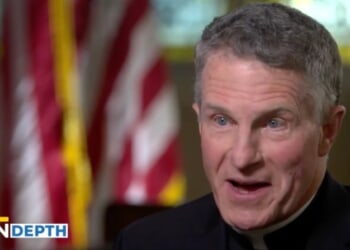President of Argentina Javier Milei warned that nations that adopt policies that bring the “comfort of the present,” such as uncontrolled public spending and mass migration, while ignoring future consequences are “incinerating their legacy” during his Wednesday speech at the United Nations General Assembly (UNGA).
Milei dedicated much of his speech to illustrate the problem of politicians who enact present-day policies in favor of gaining more votes without measuring what dire consequences it may have in the future.
Wednesday marked Milei’s second U.N. speech. A year ago, in 2024, Milei torched the international organization in his remarks, stating that, while the U.N. achieved its original purpose of stopping a new world war, it has since then become “a leviathan of multiple tentacles that wants to decide not just what every state or nation should do, but how all the citizens of the world should live.”
The Argentine president reiterated the criticisms and said that although Argentina believes in the U.N.’s original purpose, it will not accompany the curtailment of individual or commercial freedoms, or violation of the natural rights of citizens of member states — an assertion he stressed using one of his widely-known phrases, “it is better to tell an uncomfortable truth than a comfortable lie.”
In that sense, he explained that the world is “stuck in the comfort of the present” and that, since “discomfort detracts from the votes and power of those who assume it, leaders prefer to do everything in their power to maintain the inherited status quo, even at the cost of future consequences, setting fire to the future to keep the present warm.”
“Thus, contemporary states have entered into a very complex dynamic that is difficult to reverse, in which the incentives of both the population and politicians tend to favor distributing today’s wealth over generating tomorrow’s wealth,” Milei said. “At all times, decision-makers are faced with the choice of either preserving the legacy entrusted to them or destroying it. This legacy can be accumulated wealth, productive capacity, laws, or anything that serves the common good.”
“In general, if they incinerate their legacy, if they opt for comfort, they will reap great present benefits, but suffer even greater future costs. If I have savings today, I lose them tomorrow. If they keep them, on the other hand, they preserve growth and prosperity, both for themselves and for future generations,” he continued.
Milei delivered his words days after Argentine lawmakers hindered Milei’s economic recovery plan by overturning presidential vetoes of bills, forcing the government to increase public spending while jeopardizing the nations’ fiscal balance — one of the most inflexible pillars of his recovery program.
Milei explained to his audience that it is necessary to find a balance so that “today’s bread does not mean hunger for tomorrow,” ensuring a sustained economic growth — but warned that respecting said principles is not in the individual interests of politicians who gain power by enlarging the state at the expense of citizens’ freedoms. Milei further explained that, for politicians, it will always be profitable to “sacrifice the future on the altar of the present” through policies that may generate votes, but at the cost of sacrificing a future of greater growth.
“The greatest manifestation of this is in those countries that show an orgy of increased public spending, since the state does not create wealth, but rather steals it and destroys it. In this scheme, politicians gain power in two ways: they legitimize themselves democratically and obtain more resources to spend,” Milei explained. “In other words, politicians have a double incentive to encourage this intergenerational betrayal. Because even though everyone loses in the future, in the present they gain more than anyone else.”
“And in this sense, if a great man is one who plants trees whose shade he knows he will never enjoy, then one who cuts down the trees that others planted in order to build his seat of power is a miserable man, in short, a despicable man. This is the great evil and the great trap to which almost all nations are slowly succumbing,” he continued.
Milei said that said problem is not a strictly economic policy one, but it can also be seen elsewhere, and pointed to indiscriminate migration through open border policies for political reasons — which he called an “invasion.”
Milei praised President Donald Trump and said that Trump’s economic, trade, and migration policies aim to reverse a course that was leading the United States to a catastrophe. He also complimented Trump for what he described as a “clean-up” of U.S. state institutions captured by leftist factions.
“And we know that a catastrophe in the United States is a global catastrophe. His firm and successful policy of curbing illegal immigration makes this abundantly clear,” Milei said. “He understands that he must do what is necessary, even if many people don’t like it, before it’s too late. In other countries, for example, it is already too late for this decision.”
“Not only that, but he is also carrying out an unprecedented restructuring of the terms of international trade, a task of titanic proportions that goes to the heart of the global economic system, because this system was predating on the industrial heartland of his country and plunging it into an unprecedented debt crisis,” he continued.
Milei met with President Trump on Tuesday. Trump, in a Truth Social post, pointed out that Milei inherited a “total mess with horrible inflation” from the preceding socialist administration, “much like Crooked Joe Biden, the WORST President in the History our Nation.” Trump said that he looks forward to continuing working closely with Milei, and described him as a “very good friend, fighter, and winner” before giving him his “complete and total” endorsement for reelection. Milei publicly thanked Trump for his friendship and for the “extraordinary gesture.”
On Wednesday, Treasury Secretary Scott Bessent announced that the U.S. is ready to help Argentina and its people, with both countries currently in talks for a $20 billion swap line with the Argentine Central Bank, as well as other measures such as purchasing Argentine U.S. dollar bonds and government debts.
Milei concluded his speech by suggesting reforms to the U.N. and rejecting episodes of leftist political violence around the world. Milei also called for the United Kingdom to resume bilateral talks over the Falkland Islands, and for the release of all hostages taken by Hamas in Gaza.
The Argentine president also made special mention of the case of Argentine gendarme Nahuel Gallo, who remains unjustly detained by the Venezuelan Maduro regime since last year under conditions of forced disappearance. Milei called for the international community to support Argentina and demand the release of Gallo.
Christian K. Caruzo is a Venezuelan writer and documents life under socialism. You can follow him on Twitter here.

















